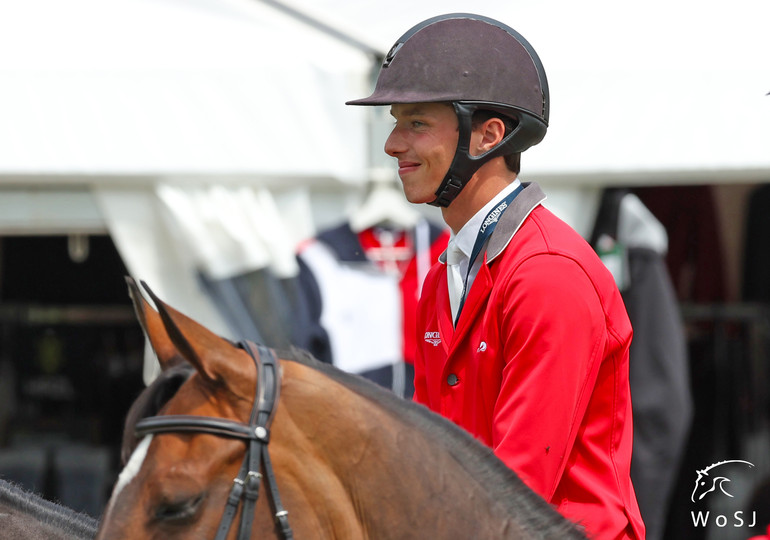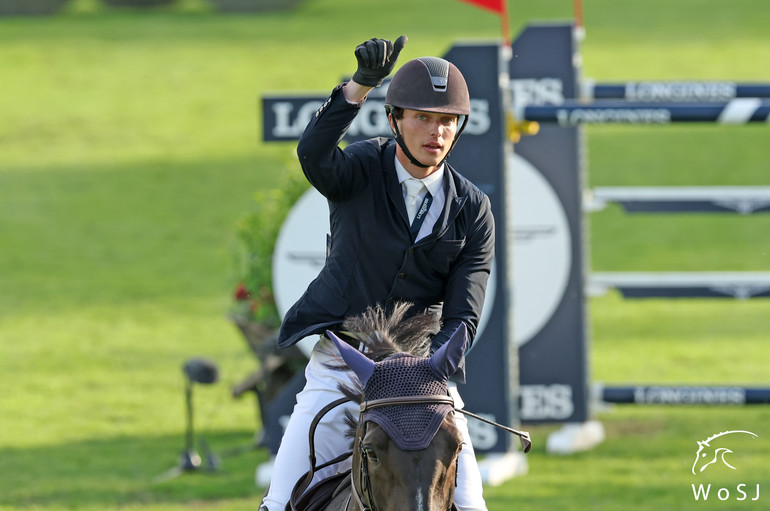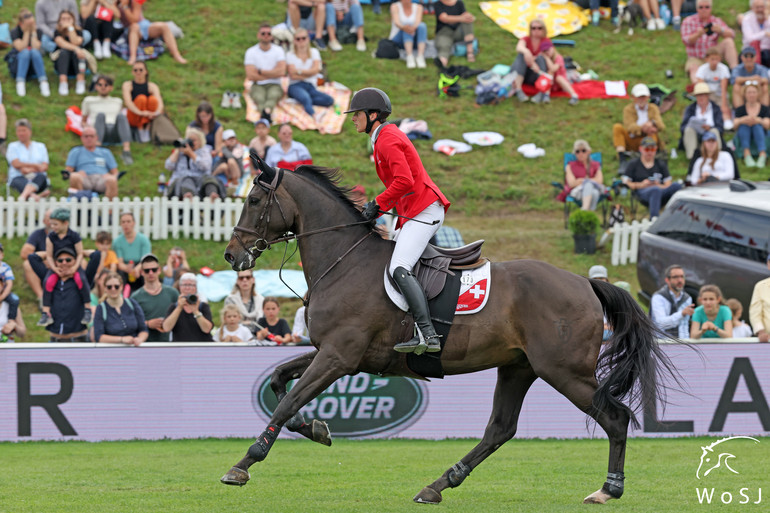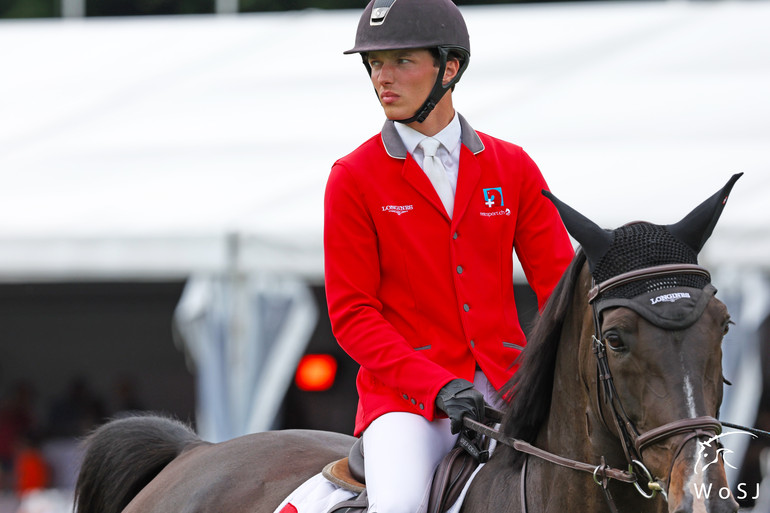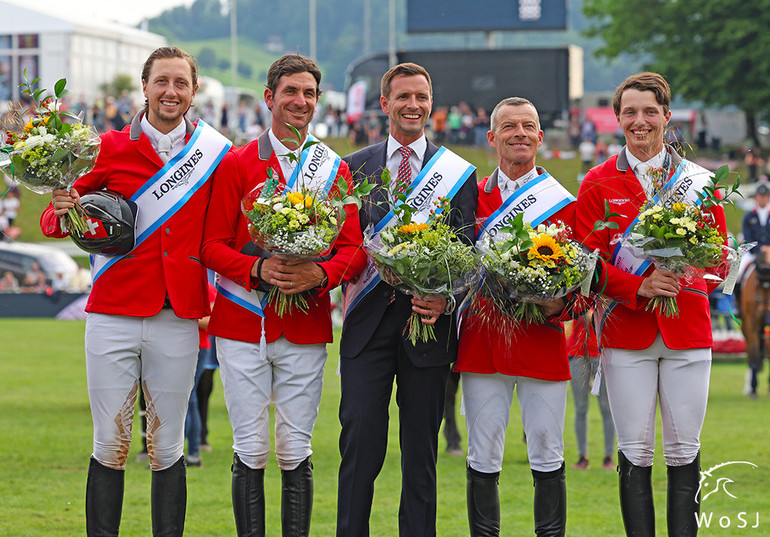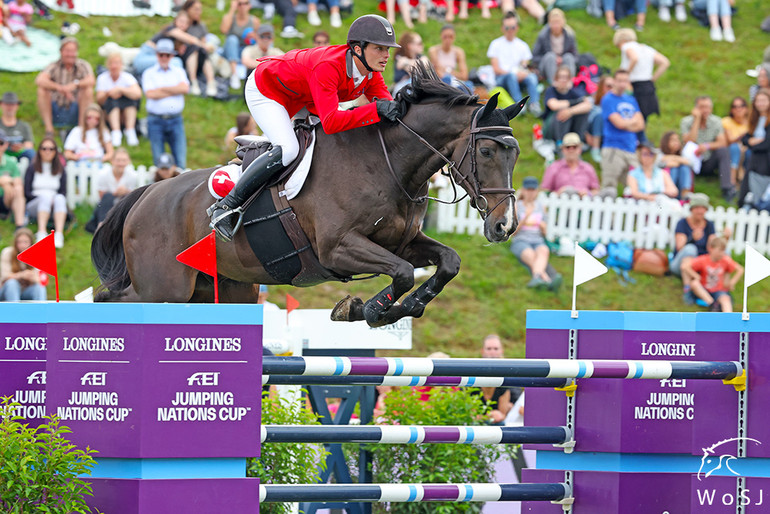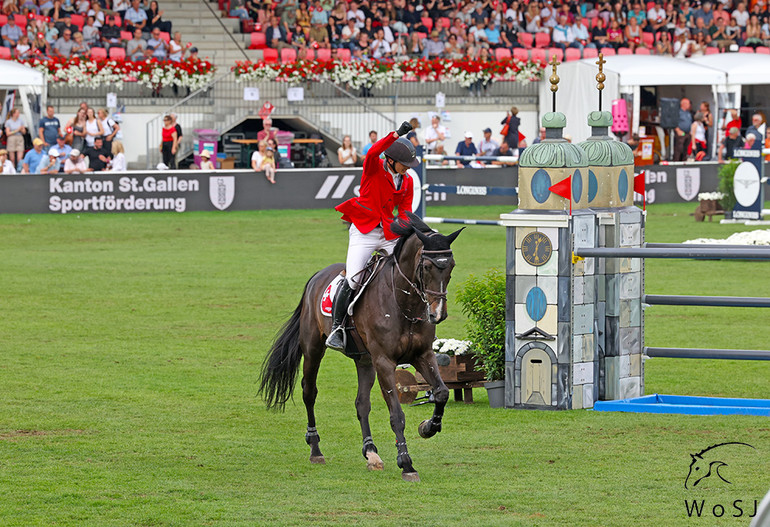Text © World of Showjumping
At this year's Longines CSIO St. Gallen, 22-year-old Edouard Schmitz made an impressive debut on the Swiss team in a five-star Nations Cup. In the Longines FEI Jumping Nations Cup of Switzerland, Schmitz and Quno (Quo Vados x Cash and Carry) posted a picture-perfect clear in round two of the competition – helping the Swiss take a popular home win. In the Longines Grand Prix, the pair jumped double clear, placing fourth behind Martin Fuchs, Wilm Vermeir and Bryan Balsiger. Fast forward to July, Schmitz and Quno have been selected to represent Switzerland at the 2022 FEI Jumping World Championship.
To World of Showjumping, the young talent talks about the huge climb from young rider to senior level, how training with Thomas Fuchs has set him up for success, and about letting horses be horses.
Determined to ride
Schmitz comes from a family where no one rides, and had to convince his parents to let him try riding in the first place. “As a child, I was always fascinated with animals and wanted to ride – but was not allowed,” he tells. “Finally, I managed to convince my parents to let me get on a horse, and since then, I never stopped. I grew up in Geneva and started with riding ponies in that area. Five years ago, I moved to Zürich where I started training with the Fuchs-family – and it all really took off from there. My parents’ interest for the sport grew at the same speed as my career advanced: They have been very supportive and totally understanding of my decisions.”
It is not easy to combine studying and competing at the highest level but I feel like I have managed over the years
Quno and Gamin van’T Naastveldhof (Tannenhof’s Chacco Chacco x Toulon) are Schmitz’s horses for the highest level, while Balenciana K (Balou du Roeut x Grosso Z) and Babylone Des Erables (Chai D x Kashmir van het Schuttershof) are competitive in the speed classes. In addition, Schmitz has a very talented 7-year-old in Karel Doorman (Dakar VDL x Hickstead), that he is building up. “Next to my studies I’ve had no time for more than these five horses,” Schmitz – who currently has taken a year off from his math and informatics studies at the University of Zürich – explains. “It is not easy to combine studying and competing at the highest level but I feel like I have managed over the years – more or less successfully. I have never had so many horses as now though, and I have a groom to help me. We try to break up the tasks so that everyone has a manageable workload.”
A professional approach
Schmitz trains with Martin Fuchs’ father, Thomas. “For me, it is the best school I can be at,” Schmitz explains. “The Fuchs-family is strict, but real horse people who have a depth of knowledge. They have a management method that has shown its efficiency and value over and over again. I think that if you look at all the people they have trained, most of them have decent results. And if you look at Martin and Steve – their results are more than decent,” Schmitz smiles.
As a rider, you don’t think only about competing; your first thought should be the well-being of your horses and the bond you are developing with them
“The essence of the Fuchs-family’s method is letting horses be horses, and I think that is really important,” he continues. “Sometimes, I feel that during our travels from one show to another, from city center to city center, we tend to forget that horses need to be horses – and I believe the method the Fuchs-family applies is a good reminder of that. At home, the horses are out a lot, and they start their day by going in the walker. We have both grass and sand paddocks and the horses will be on either one of those, or both, and then they get ridden. In the afternoon, they go out again; the goal is to have them out as much as possible. We hack them out a lot; I like to ride up and down the hills. We focus on making the training as fun and diverse as we can. As a rider, you don’t think only about competing; your first thought should be the well-being of your horses and the bond you are developing with them. For me, that is horsemanship.”
“I think I got more professional in the way I work when I started training with Thomas. The way you manage the horses at home, how you plan a season – there are many things about the management and one’s behavior at the shows that you need to be taught if you don’t come from a family that has done this sport forever,” Schmitz says. “I feel like if you come from such a family, these things come automatically; you have grown up with this. I did not come from that environment, so these things did not come naturally to me. It has been invaluable to have Thomas and Martin show me the way. I get to observe how Martin works his horses, I have learned a lot from him and the feedback he gives me. I feel like I have grown a lot as a person since I moved to them; getting screamed at every once in a while, forges character.”
The biggest lesson within the sport has been that sometimes you can do everything right and nothing works out and sometimes you can do everything wrong but still end up on top
“There have been times where I was frustrated with my rounds and got a comment from Thomas regarding my attitude,” Schmitz continues. “I wasn’t good at dealing with a bad day. I feel like this is also a part of getting older; you learn how to deal with it better and faster. I joke to say that I need ½ hour after a bad round, but I do get over myself quite quickly now. One thing Thomas always says we shouldn’t do is watch too many starters before you ride. He wants me to watch some – no matter how, I have to find a way to watch a few – but not too many. Little things like that have really helped me along the way, like not building up too much of a ritual before my round, because the day you don’t get to do it, you will be lost. The biggest lesson within the sport has been that sometimes you can do everything right and nothing works out and sometimes you can do everything wrong but still end up on top. Therefore, you just have to keep putting the same effort in, keep your head down and trust yourself.”
The Swiss team spirit
Before his appearance in the red Swiss team jacket at St. Gallen, Schmitz got a taste of the five-star Nations Cup scene when he was the fifth rider for Switzerland in La Baule. “I was plugged into a team that won the European Championships,” he says. “It was those four riders that took the gold medal in Riesenbeck, and me – connected to them. One strength of the Swiss is that we are really a group, we have a very good team spirit. If you are on the Swiss team at a Nations Cup event, whether you are fifth or fourth, you are a part of the team and you try to help the others in every way that you possibly can. I was on the team in the second division EEF Nations Cups a few times, but La Baule was the first time I was with at five-star level. For me, a Nations Cup is a Nations Cup; you wear the red jacket and you defend your country. There is the same will to do well, no matter the level. However, I feel like it is even more thrilling to ride on the highest level.”
As a Swiss person, it is impossible not to look up to Steve Guerdat
“You need to prove your worth, but once you are in there, you actually have a really good chance of doing something; getting a podium finish or a win,” Schmitz continues to speak about the strength of the Swiss team. “A funny fact about me and our Chef d’Equipe Michel Sorg is that when I was a 12-year-old pony rider, Michel did my first ever interview – and I was very nervous about it. It is funny how we have both come a long way since, I am happy to share this journey with him. I think he is doing a great job leading the team and bringing everyone together. He cares deeply about our sport.”
“As a Swiss person, it is impossible not to look up to Steve Guerdat,” Schmitz continues. “He represents so many core values of our sport – he is a true competitor and a real horseman. Both Martin and Steve have really contributed to the development of our sport in Switzerland.”
You can’t have the butter and the money for the butter
Before climbing up to senior level, Schmitz represented Switzerland at three European Championships for young riders – in 2017 in Samorin, in 2018 in Fontainebleau and in 2019 in Zuidwolde. “I think there is big gap in how good you need to be as a young rider, and how good you have to be to be considered even a decent professional showjumper,” he points out. “A young rider can feel very prepared to what is going to come after the young rider Nations Cups or the Europeans, but I think there is a huge difference in what kind of performances you need to deliver in order to do well on senior level. For me, this felt like the biggest challenge; you go from being considered decent to actually being very far off from the performances needed. The speed, height and the riders you compete against are totally different.”
Going into anything only thinking about the outcome is not the right mentality
“Whenever I start something, I define what it is going to take and if I am ready to put in that effort,” Schmitz says about the work needed to make it as a professional rider. “This is something that comes out in everything you do in life: If you are not ready to pay the price, you are not going to get it. In French, we have a saying; ‘you can’t have the butter and the money for the butter’. So, you have to decide. I think there are many young riders who are ready to put in the work, but maybe just don’t know where and how. I believe there is a limit on which opportunities you can get, and if you get them, what you make out of them depends on you. However, you have to accept the chance of failure: You can’t do something and expect you are going to succeed. You should enjoy the process enough so that in case you don’t get to where you wanted to go, you won’t feel like you have wasted your time and energy. Going into anything only thinking about the outcome is not the right mentality. I would say most of the people that I know from my pony years, those who enjoyed the process, are now competing at the higher level.”
You have to realize that it all goes step by step
“I feel like I have been very lucky with the opportunities I have gotten,” Schmitz continues. “First of all, I am lucky to be Swiss; I believe we get a lot of opportunities. I have definitely had it easier than someone from Germany for example; there, you have a much larger group of riders. If I look at my career, I got fast-tracked a bit because I got an opportunity through the Swiss federation to do bigger shows. However, the way the system works now – with the ranking tied to the invitation system – you do actually get a chance. There is a lack of humbleness though, which I also had: Coming out of the young riders, you think you deserve a shot straight away at bigger shows. You have to realize that it all goes step by step. It takes a certain type of horse and rider to perform at the highest level. Being good in a three-star Grand Prix does not entitle you to get a shot on the five-star level. Of course, if you get those shots, it accelerates things monstrously, but the one does not imply the other.”
Dreaming keeps us moving forward
“One aspect that I really enjoy in our sport is how the relationship with the horse plays a huge role,” Schmitz says. “You have never seen a championship won by a horse-and-rider combination that was recently matched together. It is possible to see these pairs win a Grand Prix, but not a major championship. Another aspect I like is the unpredictability: If you look at sprinting or high jump, there is usually one that is clearly better and keeps winning. What I think is beautiful in our sport is how sometimes you can do everything right without winning, and sometimes you can do everything wrong and still get lucky. This gives everyone a chance and makes it so interesting to watch; you can foresee an outcome but there will always be surprises.”
Dreaming is what keeps us moving forward, so I am going to keep dreaming
“Most of the riders would tell you that what they like the most is the bond we create with our horses,” Schmitz continues. “I do not understand how anyone could think that we could force an animal to do anything. We really need to put the focus on how much we care about our horses; which is anyway the essence of our sport. We have to highlight that and focus on keeping the horse at the center of the equation.”
“I try to have a mindset of just thinking day by day; I simply focus on improving myself and believe that what comes, comes,” Schmitz says about his goals for the future. “However, I think every athlete that says he or she never thought about the Olympic Games is a liar. Dreaming is what keeps us moving forward, so I am going to keep dreaming.”
No reproduction without permission, copyright © World of Showjumping



